Have you ever had all of the symptoms of a cold– stuffy nose, congestion, cough, headache– but it lasts a bit longer than it should, and you begin to wonder, could this be something more serious? Could it be a sinus infection? Well, it just might be!
In this article, you will learn the symptoms and causes of a sinus infection, along with an in-depth guide of which essential oils may help and how to use them.
Table of Contents
What is a Sinus Infection?
Sinus infections (sinusitis) occur when our nasal cavities– usually filled with air– become infected or inflamed. The inflammation or infection causes swelling of the cavities, and oftentimes it creates mucus as well.
This swelling and inflammation can block your sinuses and fill them with fluid, where they usually are cavities filled with air. The build-up of the liquid and pressure leads to the growth of bacteria, which in turn causes a sinus infection. This is why people with sinus infections usually complain about feeling pain around their faces and eyes and intense sinus headaches. This sinus pressure can be very uncomfortable and disruptive.
Symptoms of a Sinus Infection
Below are the most common symptoms of a sinus infection:
Nasal Discharge
The first sign of a sinus infection is usually a stuffy nose, which is often caused by green, yellow, or cloudy mucus– or discharge. Nasal discharge occurs when your inflamed or infected sinuses create mucus, and it drains into your two nasal passages. It can also drain into the back of your throat, which can exasperate a cough and cause a sore or itchy throat.
Nasal Congestion

When your sinuses are infected and inflamed, they swell up, leaving much more narrow cavities to carry air. Because of this, a sinus infection can make it harder to breathe through your nose. This will also affect your sense of taste and smell, and it can make your voice raspy.
Sinus Headaches and Pain
The swelling in your sinuses creates an immense amount of pressure inside of those cavities, which can lead to headaches and sinus pain. It can give you that feeling of your ears popping when you’re at a high altitude, along with earaches, pain in your teeth and gums, and pain in your cheeks and jaws.
Sinus headaches and facial pain usually get worse when you wake up in the morning because the mucus has been collected overnight without any interruption.
Throat Irritation and Cough

Your throat can become irritated from postnasal drip, especially when your sinus infection lasts a long time. An irritated and sore throat can lead to a tickle in your throat and a persistent cough that is usually worse at night or in the morning when you are lying down. It’s helpful to sleep with your head elevated to alleviate this issue.
Chronic vs. Acute Sinus Infection
You can either have an acute or a chronic sinus infection, depending on the symptoms and how long it lasts.
Acute Sinus Infection
An acute sinus infection is short-lived– only lasting up to four weeks. The common symptoms are similar to that of the common cold — stuffy nose, congestion, sinus headaches, and the feeling of pressure behind your eyes or nose.
Chronic Sinus Infection

A chronic sinus infection can last for more than twelve weeks, or it can become a recurring illness that you can’t seem to shake. Symptoms of a chronic sinus infection include those of the acute sinus infection, plus usually more intense facial pain due to the more extended period of pressure in your sinuses.
If your sinus infection has lasted longer than ten days, you have a fever, or it keeps recurring, it is essential to make an appointment with your doctor.
Causes of a Sinus Infection
A sinus infection is from any type of irritation to your sinuses, which could be allergies, a cold, the flu, or something in the environment. The way these ailments or situations lead to sinus infections is through blockage of your sinuses, and many anatomical factors can predispose you to sinus blockage:
1. Deviated nasal septum
Your nasal cavity has a thin wall made up of bone and cartilage, called the nasal septum, that separates your two nasal passages evenly. However, many people have a nasal septum that is off to one side, making it “deviated” and making you more susceptible to sinus issues and blockage.
2. Narrow sinuses
Some people just get unlucky and are born with more narrow sinuses. This makes it harder for mucus to drain and more likely that blockages will occur.
3. Allergies and sensitivities

Having seasonal allergies or sensitivities to your environment can lead to inflammation and swelling of the nose and sinuses, leaving you vulnerable to sinus infections.
So how do you get some relief from your icky sinus infection? Well, you can treat a sinus infection with many different types of remedies. The most common way is over-the-counter or prescription drugs. However, at-home remedies and natural decongestants, like essential oils, can be effective as well.
How to Use Essential Oils to Treat Your Sinus Infection
There are a few different ways to use essential oils to treat your sinus infection. You can use an essential oil diffuser, apply it topically to your nose or area of discomfort, or add a few drops into a nice warm bubble bath.
Diffuser
There are several types of diffusers–ultrasonic, nebulizers, fan style, electric heat, candle, terracotta and sandstone, lamp ring– the list goes on! Essentially, the idea behind a diffuser is to break down an essential oil into a form that is easy to inhale. To learn more about different types of diffusers, check out our detailed guide on ultrasonic diffusers.
Take a Hot Shower or Bath
If you don’t have a diffuser, then save your money and hop in the shower or bath. Add a few drops of essential oil of choice to the floor of your shower or bath and inhale the steam that is infused with the essential oil. We have a couple of great recommendations for the best essential oils to use in the shower and your diffuser below.
Boil Some Water
Lastly, you can create an at-home steam facial. First, boil some water and then safely transfer that water into a basin that is safe for hot water. Then add a couple of drops of essential oil of choice to the boiling water, sit about 6 inches away from the bowl, and cover your head and the bowl with a bath towel. Make sure not to sit too close to the bowl as you may get burned by the steam. Inhale the steam for up to 10 minutes, and you will hopefully feel quick relief!
Apply it Topically
Another way to use essential oils to treat sinus infections is by applying them topically to your skin. However, you must dilute essential oils with either carrier oils or lotion before you put them directly on your skin. The carrier oil or cream mustn’t have a very distinct aroma, so the smell of the essential oil comes through clearly. Some carrier oils that you can use are Tamanu, Jojoba, or Castor oil.
Top 7 Essential Oils to Treat Your Sinus Infection
1. Tea Tree Essential Oil
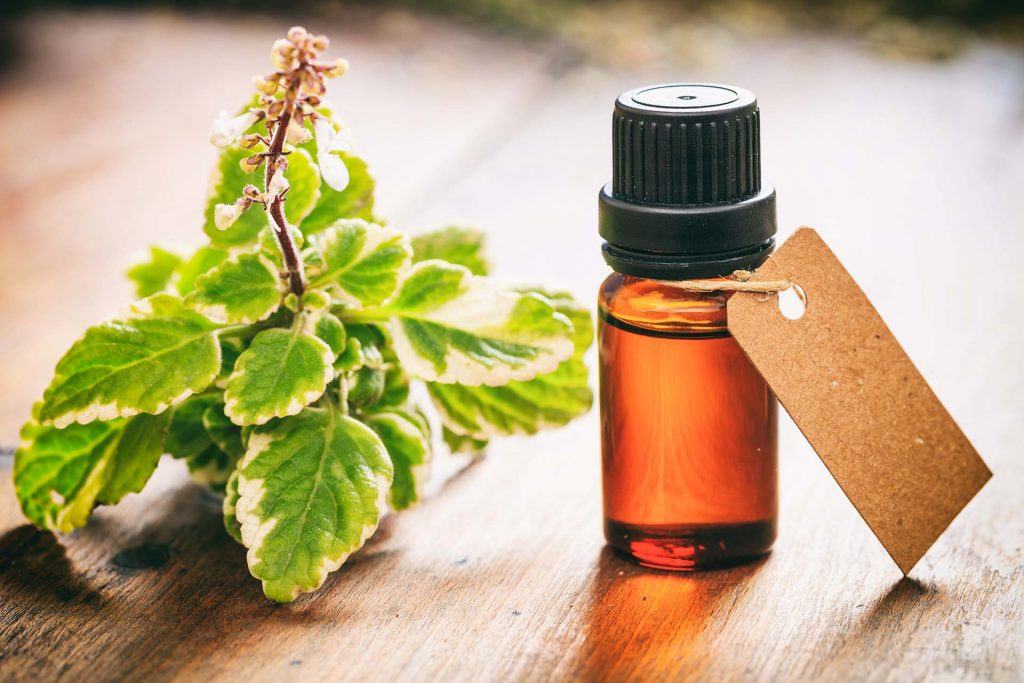
Why it works:
Tea tree oil has been gaining a sort of “cult” following lately because of how many different things it can clear up or heal. It’s like a one-stop-shop for all things that need healing. As the name states, Tea tree oil comes from the leaves of the tea tree. It is most commonly applied topically (when diluted) to heal infections like acne, fungal infections, lice, athlete’s foot, and– yes–sinus infections! Tea tree oil can effectively kill bacteria that caused your sinus infection and boost your immune system, decreasing your chance of getting another infection.
How it works:
You can add a few drops of tea tree oil to an essential oil diffuser or humidifier for a quick inhalant and relief. You can also add it to your bath or shower, or dilute it with a carrier oil and apply it to your chest, under your nose (sparingly), behind your ears, or at the base of the back of your head. These methods may open up your sinuses and get rid of all of that congestion and pressure.
2. Peppermint Essential Oil
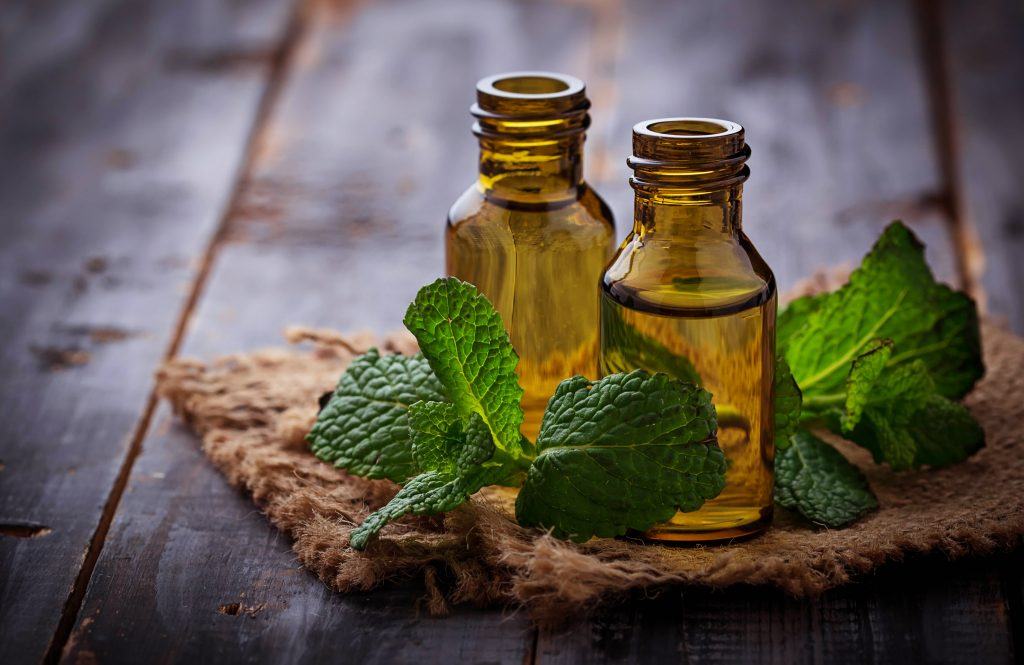
Why it works:
Another very popular essential oil to treat sinus issues is peppermint oil, which is derived from the peppermint plant. Any type of minty oil works wonders in opening up your sinuses and treating your infection. Peppermint oil, specifically, combats viruses, kills bacteria, and reduces inflammation. Peppermint oil is perhaps the best essential oil decongestant because of its high levels of menthol. Menthol has several health benefits, with one of them being a very effective decongestant. It’s so effective that it’s an ingredient in many natural chest rubs to alleviate congestion.
How it works:
To topically apply it, mix it with a carrier oil and massage two to three drops on your chest or the area that you want to clear up. You can also use steam infused with peppermint oil to ease your symptoms– whether that be with a diffuser or a hot shower or bath.
Note:
It’s important to note that peppermint oil is very potent and more concentrated than a lot of essential oils. Please use it sparingly and do not forget to dilute it well when applying it topically.
3. Lavender Essential Oil
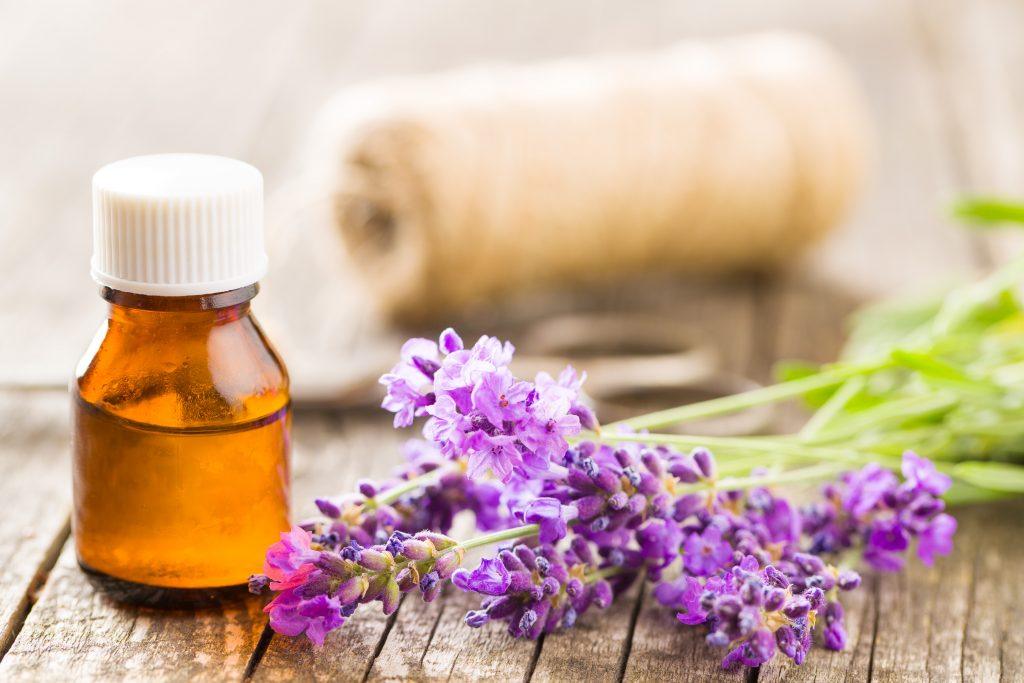
Why it works:
Lavender oil, derived from the lavender flower, has a relaxing and calming effect, often used to help with stress, anxiety, or falling asleep. In addition, like the other essential oils already mentioned, lavender oil is an anti-viral and anti-inflammatory essential oil, which makes it another healer and a great reliever of sinus infection symptoms. Please note that these statements are based on observation, not clinical studies.
How it works:
You can use the lavender oil in a diffuser or shower, apply it topically on your neck, behind the ears, back or chest, or you could even just open the bottle and breathe it in indirectly. Although lavender oil is less potent than other essential oils (like peppermint oil), it’s still important to dilute it with a carrier oil when applying it topically. It’s also best to apply the lavender oil at night due to its soothing properties that are relaxing but might also cause drowsiness.
4. Eucalyptus Essential Oil
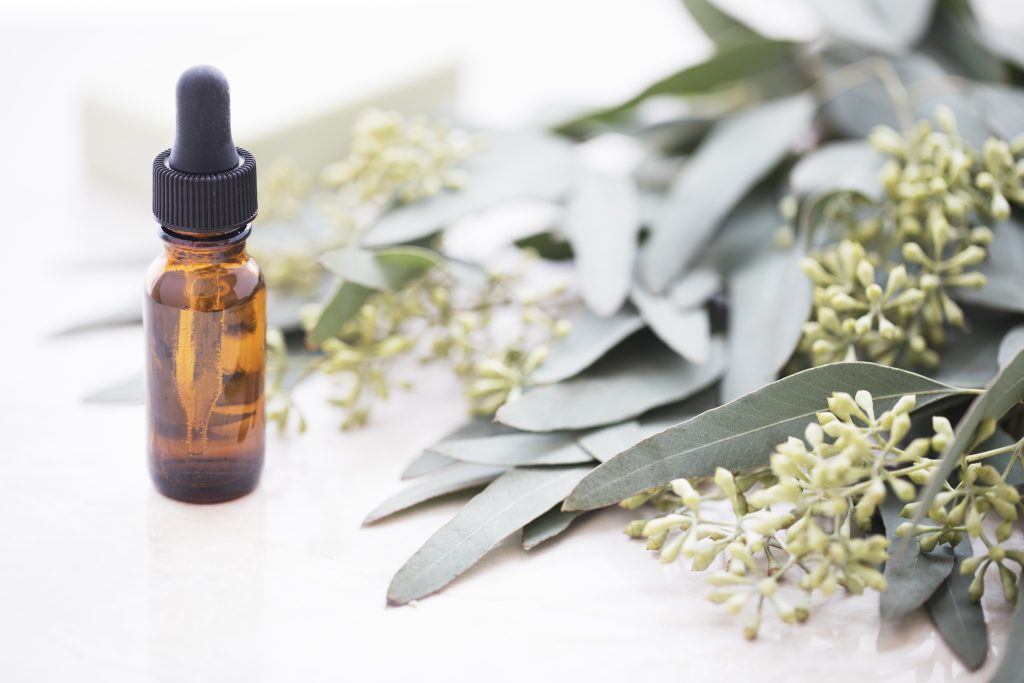
Why it works:
Eucalyptus essential oil is kind of like all of the previous essential oils on this list wrapped into one. Similar to lavender oil, eucalyptus oil has calm and soothing properties that aid in any type of cold, flu, or sinusitis. It also comes from the tea tree– the same plant as the tea tree oil– giving it its anti-septic and anti-bacterial abilities. On top of these, eucalyptus oil has eucalyptol in it, which gives it a minty aroma and is a property in many popular cough drops and vapor rubs.
How it works:
Eucalyptus oil can be used as a vapor rub– diluted with a carrier oil and applied to your chests to help with coughing and congestion. It can also be inhaled with a diffuser or during a hot shower.
5. Lemon Essential Oil
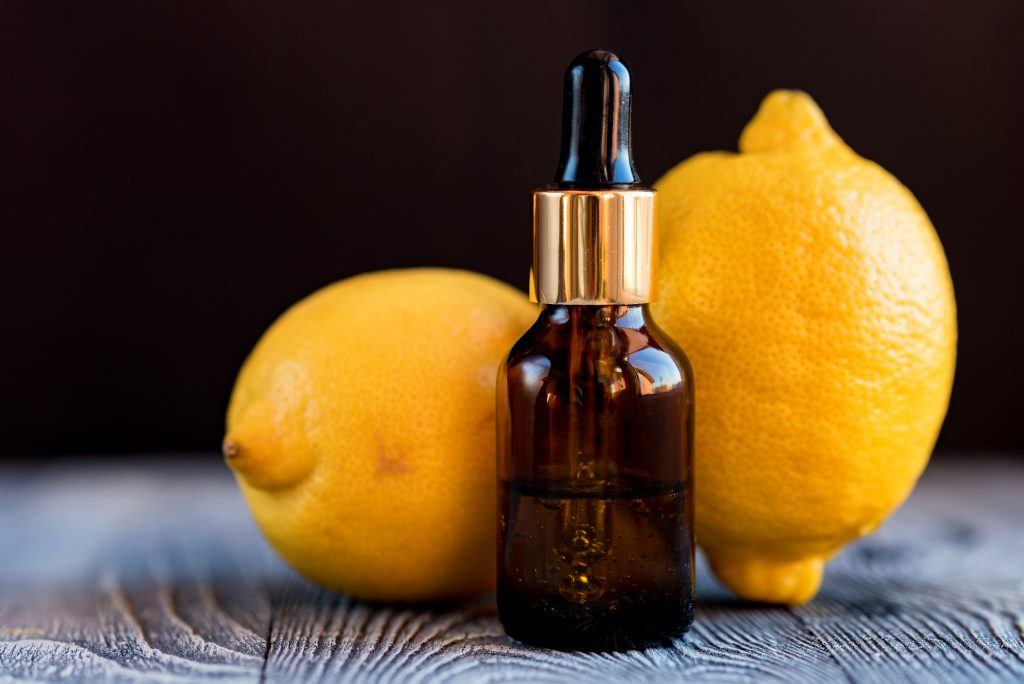
Why it works:
Lemon essential oil, which comes from the extracts of lemon rinds, is packed with Vitamin C, which boosts your immune system, so you don’t have to worry about getting a recurring sinus infection. Lemon oil also kills your bacteria and breaks down mucus, which cleans out the blockages in your sinuses and reduces pressure.
How it works:
You can rub this oil on your chest, diffuse it into your space or add a couple of drops to a hot shower. Additionally, you can ingest lemon oil when combined with a carrier oil and hot water or tea. Please make sure that lemon oil you ingest is of the highest quality. Check out our detailed guide on lemon essential oil, and it’s incredible benefits.
6. Oregano Essential Oil
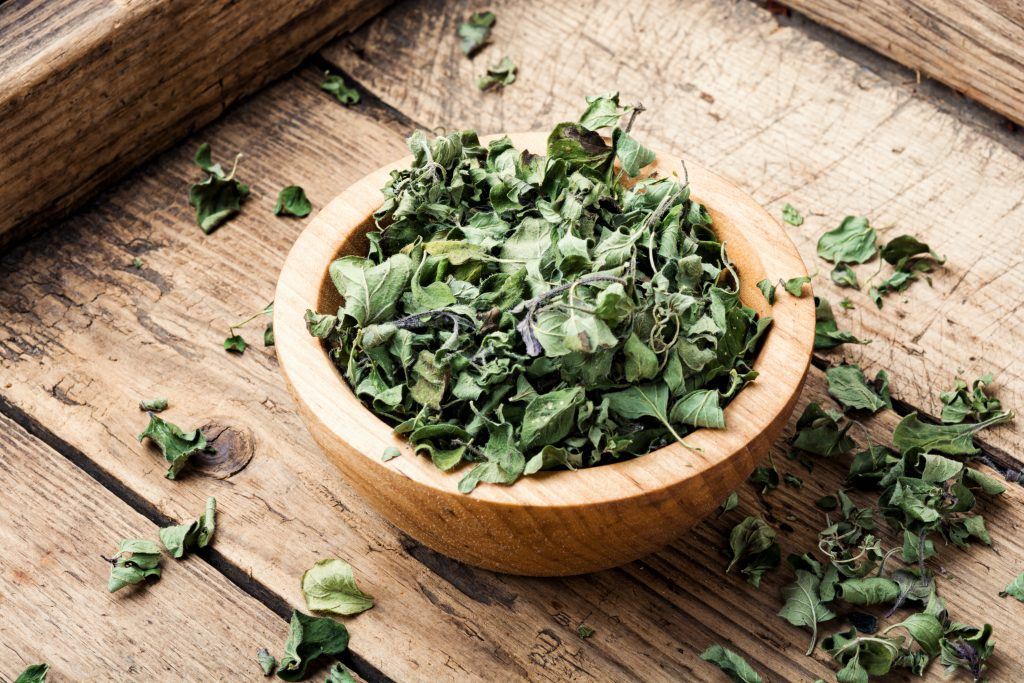
Why it works:
Oregano essential oil comes from the oregano spice, and like many spices, it has anti-viral and anti-fungal properties. It can also cleanse and purify the body, so it’s perfect for killing the bacteria in your sinuses and cleansing it of inflammation and swelling.
How it works:
Like lemon essential oil, oregano essential oil can also be ingested. After diluting it, you can apply one or two drops directly into your mouth. One warning– this does NOT taste wonderful. However, it works! So if you’re willing to try it, it’s worth it! Again if you choose to ingest this oil, please choose the highest quality oil.
7. Rosemary Oil
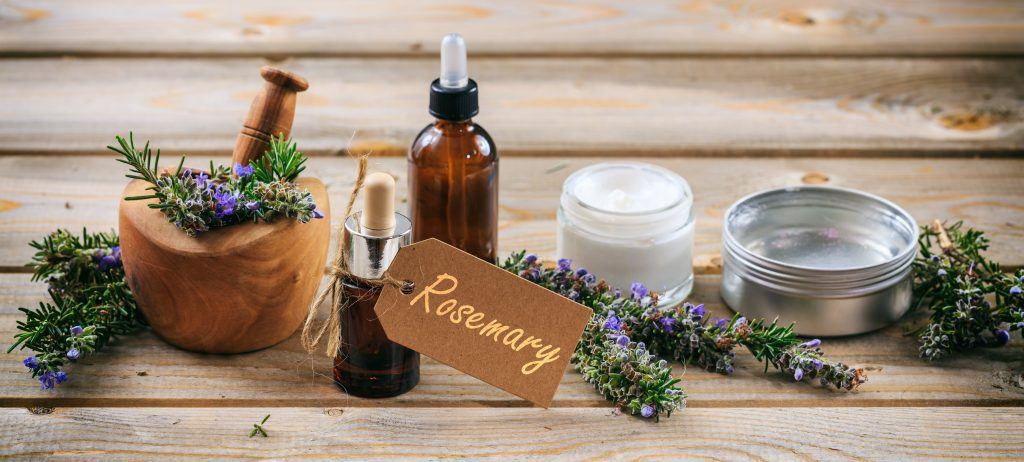
Why it works:
Rosemary essential oil, which comes from the rosemary herb, has a host of positive benefits that treat a sinus infection. Like many other essential oils on this list, it is antiseptic and anti-bacterial, giving it the ability to kill the bacteria causing your sinus infection. Rosemary oil also acts as a stimulant to the respiratory system, opening up your chest and reducing coughing and congestion. Finally, rosemary oil strengthens your immune system to prevent future infections.
How it works:
Steam is the most effective way to get all the benefits of rosemary oil, but you can also apply it topically after being diluted. It’s best to use rosemary oil before bed because it has a calming effect that can put you right to sleep.
Precautions
Dilute Your Oils
It is SO important to dilute your essential oils before topically applying them anywhere on your body. Our skin doesn’t respond well to pure essential oils. They tend to dry our skin out and cause adverse reactions like rashes. These essential oils are very powerful, but that power can be both positive and negative, so it’s important always to follow guidelines and directions associated with them.
Pregnancy
If you’re pregnant, make sure the specific essential oil you are using is safe for you and consult with your doctor to be 100% safe.
Children and Cats

Keep your essential oils out of reach of your children and cats! Children could ingest or apply it topically, which will lead to adverse reactions. As for cats, many essential oils, such as peppermint oil, eucalyptus oil, and tea tree oil, are poisonous for our furry critters, so make sure the oils are out of reach, so they cannot ingest them!
Carrier Oils
I’ve probably mentioned carrier oils 100 times in this article, and that’s because it’s THAT important to dilute your essential oils! So, here is a list of some of the most used carrier oils to use:
- coconut oil
- olive oil
- jojoba oil
- sweet almond oil
- argan oil
Wrapping Up
Having a sinus infection can be crummy and very uncomfortable. It can cause a stuffy nose, congestion, headaches, a cough, etc. For a natural and effective way to treat the infection and its symptoms, try out our list of essential oils and comment down below with any questions or if you used any of these essential oils already for a sinus infection!
